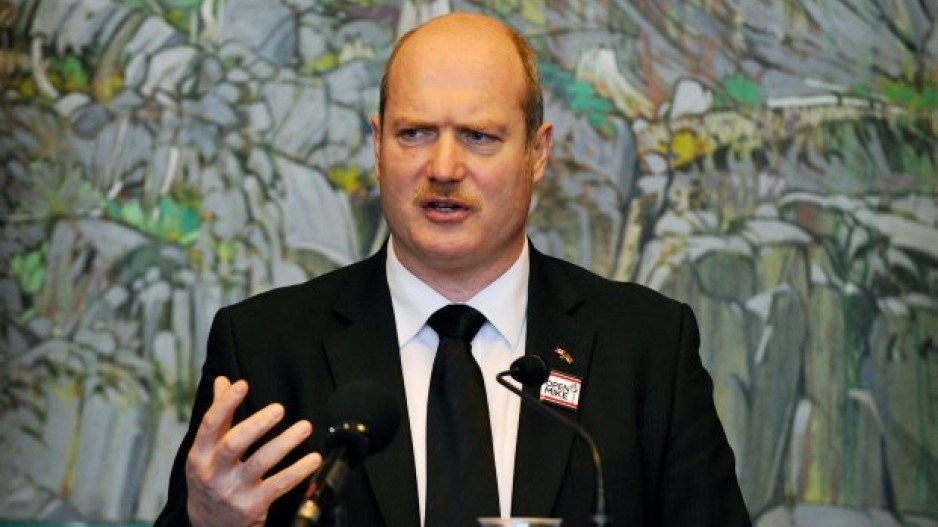B.C.’s NDP government Oct. 26 shot down a Liberal Party suggestion that controversial changes to the provincial Freedom of Information and Privacy Act should be sent to a special committee for reconsideration.
Those amendments pose a threat to the privacy of British Columbians, Liberal MLA Todd Stone told the Legislature in suggesting the bill be referred to the committee set up to review such legislation.
However, his suggestion during second reading to reconsider the “deeply flawed” bill was defeated in a 50-29 amendment vote.
Second reading was then passed in a 52-29 vote with applause from the NDP.
De Jong questioned why NDP MLAs would not even address Stone’s suggestion before defeating it.
“Not one of them could mouth one word, nay, not one word or syllable to justify the vote they just made,” he said of the NDP members. “That is despicable.”
He said the silence is a case of the NDP really saying, “We’ll do what we want when we want because we can.”
He called NPD members refusing to address Stone’s bill changes “weakness.”
The Freedom of Information and Protection of Privacy Act (FIPPA) amendments it said would help people access services faster while strengthening privacy protections.
“We’re making changes today to keep pace with advancements in technology and provide the level of service that people expect in the digital era,” Minister of Citizens’ Services Lisa Beare said at the time.
Among the changes are:
• updating FIPPA’s data-residency provisions so public bodies can use modern tools while continuing to protect personal information;
• enhancing public-sector privacy protections and increasing accountability by implementing mandatory privacy-breach reporting;
• introducing a modest application fee for non-personal freedom of information (FOI) requests; and
• demonstrating the province’s commitment to diversity, inclusion, reconciliation and equity by increasing information sharing with Indigenous peoples, adding Indigenous cultural protections and removing non-inclusive language.
Stone said Bill 22 proposes allowing the government to use information people post on social media and to store information outside Canada contrary to current data residency requirements governed by strict protection protocols.
He said the bill would allow the government to take things British Columbians post on social media about government programs to help build profiles of those people.
“What is the government's intent here?” Stone asked. “This has the potential to be a significant invasion of personal privacy.”
“I hope the minister’s embarrassed,” de Jong said. “I hope she's not proud.”
De Jong said the silence leads him to believe the government believes itself unanswerable for its actions.
“A sad day.”
Beare accused the Liberals of fear-mongering, adding the bill would be discussed “clause by clause” in committee. That discussion would be in the committee of the whole separate from the special one intended to deal with such specific legislation.
Even the officer of the Legislature, Freedom of Information and Privacy Commissioner Michael McEvoy, has called parts of the bill “exceedingly troubling.”
Indeed both Stone and Liberal MLA Mike de Jong wondered why McEvoy’s input was not being taken into account.
Critics have said the bill leaves too many questions unanswered, saying waiting for the bill to pass into law before revealing what might be in accompanying regulations is not acceptable.


.jpg;w=120;h=80;mode=crop)

.jpg;w=120;h=80;mode=crop)
